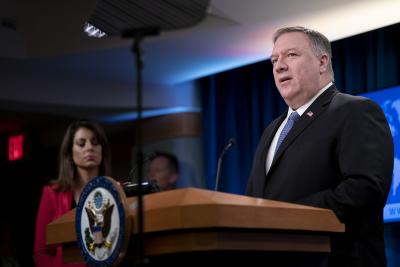'US move to designate Houthis as terrorists may have repercussions'
By IANS | Published: January 12, 2021 02:42 PM2021-01-12T14:42:03+5:302021-01-12T14:55:23+5:30
United Nations, Jan 12 The US government's decision to designate Yemen's Iran-backed Ansar Allah, more commonly known as ...

'US move to designate Houthis as terrorists may have repercussions'
United Nations, Jan 12 The US government's decision to designate Yemen's Iran-backed Ansar Allah, more commonly known as the Houthi militia, as terrorists is likely to have serious repercussions, a UN spokesperson said.
"It's clear that the decision is likely to have serious humanitarian and political repercussions," Xinhua news agency quoted Stephane Dujarric, spokesman for UN Secretary-General Antonio Guterres, as saying at a press briefing on Monday.
In a statement issued on Sunday, Secretary of State Mike Pompeo said the US will designate Yemen's Iran-backed Houthi rebels as a foreign terrorist organisation, a move aid groups have warned could hamstring attempts to deal with what many consider to be the world's worst humanitarian crisis.
Pompeo cited the December 30, 2020, attack on Aden Airport, which killed at least 26 people and injured more than 50 others.
Pompeo will present his plan to Congress on January 19 and, if the US follows through on his threat, imports of food, and other essential items, could be negatively impacted, at a time when more Yemenis are starving, Dujarric warned.
Pompeo's statement acknowledged concerns that the designations would have an "impact on the humanitarian situation in Yemen", adding that the US would put in place measures to reduce their impact.
Dujarric called for the US to ensure that licenses and exemptions are granted, so that humanitarian assistance continues to reach the people who need it, and the private sector can continue to function in order to stave off complete economic collapse and large-scale famine.
The huge humanitarian operation in the country, the largest in the world, cannot replace the private sector or compensate for major drops in commercial imports, he added.
The political process in Yemen also risks being destabilised as a result of the terrorist designation, Dujarric said, and the positions of the opposing sides in the conflict could become even more polarised.
According to figures released by the UN in December 2020, more than 230,000 Yemenis have died in the war, mostly because of a lack of food, health services and infrastructure.
Dujarric pledged that the world body will continue to work with all parties to "resume and continue an inclusive political process to reach a comprehensive negotiated settlement to end the conflict".
The Houthi militia has intensified attacks on the Yemeni government-held cities in the past year that killed and injured hundreds of people, according to the government of the war-torn country.
Yemen has been mired in civil war since late 2014, when the Houthi rebels seized control of northern provinces and forced the internationally-recognized government of President Abd-Rabbu Mansour Hadi out of the capital Sanaa.
The Saudi-led Arab coalition intervened in the Yemeni conflict in 2015 to support Hadi's government.
( With inputs from IANS )
Disclaimer: This post has been auto-published from an agency feed without any modifications to the text and has not been reviewed by an editor
Open in app